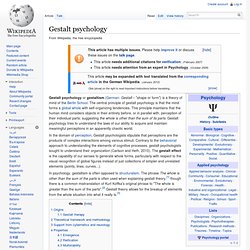

Basics - Bringing New Understanding to the Director’s Cut. Rorschach test. The Rorschach test (/ˈrɔrʃɑːk/ or /ˈrɔərʃɑːk/,[3] German pronunciation: [ˈʁoːɐʃax]; also known as the Rorschach inkblot test, the Rorschach technique, or simply the inkblot test) is a psychological test in which subjects' perceptions of inkblots are recorded and then analyzed using psychological interpretation, complex algorithms, or both.

Some psychologists use this test to examine a person's personality characteristics and emotional functioning. It has been employed to detect underlying thought disorder, especially in cases where patients are reluctant to describe their thinking processes openly.[4] The test is named after its creator, Swiss psychologist Hermann Rorschach. Although the Exner Scoring System (developed since the 1960s) claims to have addressed and often refuted many criticisms of the original testing system with an extensive body of research,[10] some researchers continue to raise questions.
History Method The interpretation of a Rorschach record is a complex process. Gestalt psychology. Gestalt psychology or gestaltism (German: Gestalt – "shape or form") is a theory of mind of the Berlin School.

The central principle of gestalt psychology is that the mind forms a global whole with self-organizing tendencies. This principle maintains that the human mind considers objects in their entirety before, or in parallel with, perception of their individual parts; suggesting the whole is other than the sum of its parts. Gestalt psychology tries to understand the laws of our ability to acquire and maintain meaningful perceptions in an apparently chaotic world.
In the domain of perception, Gestalt psychologists stipulate that perceptions are the products of complex interactions among various stimuli. Contrary to the behaviorist approach to understanding the elements of cognitive processes, gestalt psychologists sought to understand their organization (Carlson and Heth, 2010). Origins[edit] Gestalt therapy[edit] Theoretical framework and methodology[edit] Properties[edit] Reification. Observer-expectancy effect. "Participant-observer effect" redirects here.

An example of the observer-expectancy effect is demonstrated in music backmasking,[citation needed] in which hidden verbal messages are said to be audible when a recording is played backwards. Some people expect to hear hidden messages when reversing songs, and therefore hear the messages, but to others it sounds like nothing more than random sounds. Often when a song is played backwards, a listener will fail to notice the "hidden" lyrics until they are explicitly pointed out, after which they are obvious.
Other prominent examples include facilitated communication and dowsing. See also[edit] External links[edit] Psychological nativism. In the field of psychology, nativism is the view that certain skills or abilities are "native" or hard-wired into the brain at birth.

This is in contrast to empiricism, the "blank slate" or tabula rasa view, which states that the brain has inborn capabilities for learning from the environment but does not contain content such as innate beliefs.This factor contributes to the ongoing nature versus nurture dispute. Some nativists believe that specific beliefs or preferences are "hard wired". For example, one might argue that some moral intuitions are innate or that color preferences are innate. A less established argument is that nature supplies the human mind with specialized learning devices.
This latter view differs from empiricism only to the extent that the algorithms that translate experience into information may be more complex and specialized in nativist theories than in empiricist theories. In philosophy[edit] Modularity[edit] Humanistic psychology. Humanistic psychology is a psychological perspective which rose to prominence in the mid-20th century in response to the limitations of Sigmund Freud's psychoanalytic theory and B.F.

Skinner's behaviorism.[1] With its roots running from Socrates through the Renaissance, this approach emphasizes individuals inherent drive towards self-actualization and creativity. It typically holds that people are inherently good. It adopts a holistic approach to human existence and pays special attention to such phenomena as creativity, free will, and human potential.
It encourages viewing ourselves as a "whole person" greater than the sum of our parts and encourages self exploration rather than the study of behavior in other people. Humanistic psychology acknowledges spiritual aspiration as an integral part of the human psyche.